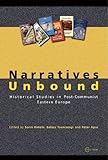Narratives Unbound : Historical studies in post-communist Eastern Europe / ed. by Balázs Trencsényi, Sorin Antohi, Péter Apor.
Material type: TextPublisher: Budapest ; New York : Central European University Press, [2022]Copyright date: ©2007Description: 1 online resource (512 p.)Content type:
TextPublisher: Budapest ; New York : Central European University Press, [2022]Copyright date: ©2007Description: 1 online resource (512 p.)Content type: - 9786155211294
- 947.00072 22
- DJK32 .N37 2007
- online - DeGruyter
| Item type | Current library | Call number | URL | Status | Notes | Barcode | |
|---|---|---|---|---|---|---|---|
 eBook
eBook
|
Biblioteca "Angelicum" Pont. Univ. S.Tommaso d'Aquino Nuvola online | online - DeGruyter (Browse shelf(Opens below)) | Online access | Not for loan (Accesso limitato) | Accesso per gli utenti autorizzati / Access for authorized users | (dgr)9786155211294 |
Frontmatter -- Contents -- Narratives Unbound: A Brief Introduction to Post-Communist Historical Studies -- Fine-Tuning the Polyphonic Past: Hungarian Historical Writing in the 1990s -- From the Splendid Past into the Unknown Future: Historical Studies in Poland after 1989 -- A Difficult Quest for New Paradigms: Czech Historiography after 1989 -- Wedged Between National and Trans-National History: Slovak Historiography in the 1990s -- Mastering vs. Coming to Terms with the Past: A Critical Analysis of Post- Communist Romanian Historiography -- Historical Studies in Post-Communist Bulgaria: Between Academic Standards and Political Agendas -- List of Contributors
restricted access online access with authorization star
http://purl.org/coar/access_right/c_16ec
The first work that covers the post-Communist development of historical studies in six Eastern European countries: Bulgaria, Czech Republic, Hungary, Poland, Romania, and Slovakia. A uniquely critical and qualitative analysis from a comparative and critical perspective, written by scholars from the region itself. Focusing on the first post-Communist decade, 1989–1999, the book offers a longer-term perspective that includes the immediate 'prehistory' of that momentous decade as well as its 'posthistoire'. The authors capture the spirit of 1989, that heady mix of elation, surprise, determination, and hope: l'ivresse du possible. This was the paradoxical beginning of Eastern European post-Communism: ushered in by 'anti-Utopian' revolutions, and slowly finding its course towards a bureaucratic, imitative, challenging, and anachronistic restoration of a capitalism that had changed almost beyond recognition when it had mutated into the negative double of Communism. Each individual chapter has numerous and detailed notes and references.
Mode of access: Internet via World Wide Web.
In English.
Description based on online resource; title from PDF title page (publisher's Web site, viewed 29. Jul 2022)


